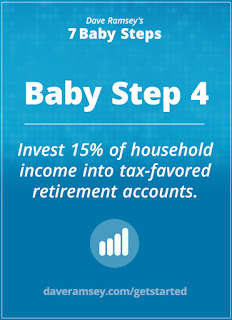Baby Step 4 - Investing

Let’s talk investing. The last four steps can be done simultaneously, but I am going to address them separately. Baby Step 4 involves investing. You should invest 15% of your gross household income into Roth IRAs and tax-favored retirement plans. Why 15%? You can work on the last 4 of the baby steps simultaneously: pay off your mortgage, save for college for your kids, etc. while investing at the same time. 15% is a safe rate to invest. Once you have paid off your home and your kid’s college fund is fully funded you can always increase the amount that you are investing. One thing you should check on is whether your company offers a Roth 401(k) option. Companies sometimes offer matching funds for your 401(k). What this means is that for every dollar that you put into your Roth 401(k) your company may match that amount. This is free money. If you are on this step, you should be maxing your 401(k) option. Invest your entire 15% here. The best part about this is that the dollars in...







